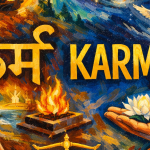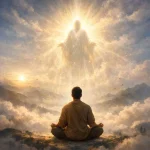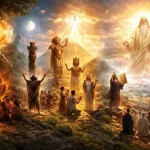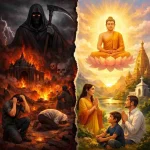The Concept of Dharma in Today’s World
The ancient Indian idea of Dharma has always been more than a religious principle—it is a timeless philosophy of living. Derived from the Sanskrit root “dhṛ”, meaning “to uphold” or “to sustain,” Dharma refers to the moral, ethical, and spiritual foundation that sustains the order of the universe and society. In today’s rapidly changing world—marked by technological progress, moral confusion, and social polarization—the concept of Dharma remains deeply relevant, offering guidance on how to live with purpose, justice, and balance.
Dharma: Beyond Religion
Many people mistake Dharma for religion, but in truth, it is far broader. While religion focuses on rituals and belief systems, Dharma emphasizes right conduct, duty, and harmony with truth. In ancient Indian texts like the Bhagavad Gita and the Manusmriti, Dharma was not a fixed rule but a living principle that adjusted according to time, place, and circumstance. Lord Krishna explained to Arjuna that Dharma is about fulfilling one’s responsibilities selflessly, without attachment to reward.
In today’s world, this idea transcends all faiths and ideologies. Whether one is a Hindu, Buddhist, Christian, or atheist, Dharma can be understood as the inner compass that helps one distinguish right from wrong and act with integrity.
Dharma and the Modern Individual
Modern life has brought both comfort and confusion. People chase success, wealth, and recognition, often losing touch with inner peace and moral clarity. Here, the concept of Dharma becomes a light in the darkness. It reminds individuals that true fulfillment does not come from external achievements but from living in harmony with conscience and responsibility.
In the professional world, Dharma manifests as honesty, commitment, and fairness. In family life, it means respect, love, and duty toward parents, children, and society. For students, it means dedication to learning and the pursuit of truth. Even for leaders and governments, Dharma translates into policies guided by justice, compassion, and equality.
Dharma and Social Order
In ancient times, Dharma maintained the balance of social life. Kings ruled according to Rajdharma—the duty of governance; citizens followed Lokdharma—the duty toward community; and monks or seekers practiced Sannyasa Dharma—the duty toward spiritual liberation. Though the world has changed, the need for such balance remains.
Today, societies face challenges like corruption, inequality, environmental destruction, and moral decay. The world urgently needs the revival of collective Dharma—a shared sense of responsibility toward humanity and the planet. This includes environmental Dharma (protecting nature), digital Dharma (ethical use of technology), and civic Dharma (acting as responsible citizens). If each person performs their Dharma sincerely, the world naturally becomes more peaceful and just.
Dharma and Global Ethics
Interestingly, the concept of Dharma aligns with modern ideas of human rights and global ethics. Where human rights emphasize the freedoms individuals deserve, Dharma emphasizes the duties they must perform. In a healthy society, both rights and duties go hand in hand.
For example, everyone has the right to live in a clean environment—but it is also their Dharma not to pollute it. People have the right to express themselves—but it is also their Dharma to speak truthfully and respectfully. Thus, Dharma provides the moral foundation that gives true meaning to human rights.
In an age of globalization, where cultures interact and sometimes clash, Dharma can serve as a universal language of ethics. It promotes the idea that all actions should serve the greater good—Sarve Bhavantu Sukhinah (May all beings be happy).
The Inner Dimension of Dharma
At its deepest level, Dharma is not imposed from outside; it comes from within. It is the quiet voice of conscience that guides one toward truth. Meditation, reflection, and self-awareness help individuals discover their personal Dharma. What may be right for one person might not be right for another, because Dharma is contextual—it depends on one’s role, situation, and intention.
In this sense, Dharma is dynamic, not dogmatic. It asks for wisdom, not blind obedience. The more a person understands themselves, the clearer their Dharma becomes.
Dharma and the Future
As artificial intelligence, climate change, and social transformation reshape the 21st century, humanity stands at a crossroads. Technology can make life easier but cannot tell us what is right or wrong. For that, we must return to eternal principles—and Dharma offers exactly that guidance.
If people, institutions, and nations start acting according to Dharma, it could bring a new era of ethical progress—where success is balanced by compassion, freedom by responsibility, and knowledge by humility. The concept of Dharma is not confined to temples or scriptures; it lives in every human action that upholds truth, justice, and harmony. In today’s complex world, where moral values are often blurred by ambition and greed, Dharma reminds us that life’s ultimate goal is not merely to exist, but to live rightly.
To walk the path of Dharma is to align oneself with the rhythm of the universe—to act selflessly, think truthfully, and serve compassionately. In doing so, one not only uplifts oneself but also contributes to the balance and beauty of the world. That is the timeless power of Dharma in the modern age.










